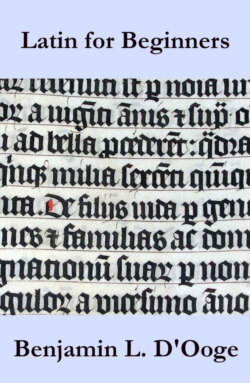Читать книгу Latin for Beginners - BENJAMIN L. D’OOGE - Страница 33
На сайте Литреса книга снята с продажи.
LESSON VII THE FIRST OR Ā-DECLENSION
Оглавление[Special Vocabulary]
NOUNS
«casa, -ae», f., cottage cēna, -ae, f., dinner «gallī´na, -ae», f., hen, chicken «īn´sula, ae», f., island (pen-insula)
ADVERBS
«de-in´de», then, in the next place «ubi», where
PREPOSITION
«ad», to, with acc. to express motion toward
PRONOUN
«quem», interrog. pronoun, acc. sing., whom?
VERBS
ha´bitat, he (she, it) lives, is living, does live (inhabit) «laudat», he (she, it) praises, is praising, does praise (laud) «parat», he (she, it) prepares, is preparing, does prepare «vocat», he (she, it) calls, is calling, does call; invites, is inviting, does invite (vocation)
«57.» In the preceding lessons we have now gone over all the cases, singular and plural, of nouns whose nominative singular ends in «-a». All Latin nouns whose nominative singular ends in «-a» belong to the First Declension. It is also called the Ā-Declension because of the prominent part which the vowel «a» plays in the formation of the cases. We have also learned what relations are expressed by each case. These results are summarized in the following table:
+————+————————+—————————-+————————————-+ | CASE | NOUN | TRANSLATION | USE AND GENERAL MEANING | | | | | OF EACH CASE | +————+————————+—————————-+————————————-+ | | | SINGULAR | | +————+————————+—————————-+————————————-+ | Nom. | do´min-a | the lady | The subject | | | | | | | Gen. | domin-ae | of the lady, | The possessor | | | | or the lady’s | of something | | | | | | | Dat. | domin-ae | to or for | Expressing the relation | | | | the lady | to or for, | | | | | especially the | | | | | indirect object | | | | | | | Acc. | domin-am | the lady | The direct object | | | | | | | Abl. | domin-ā | _from, with, by, | Separation (from), | | | | in, the lady_ | association or means | | | | | (with, by), place | | | | | where or time when | | | | | (in, at) | +————+————————+—————————-+————————————-+ | | | PLURAL | | +————+————————+—————————-+————————————-+ | Nom. | domin-ae | the ladies | | | | | | | | Gen. | domin-ā´rum | of the ladies, | | | | | or the ladies’ | | | | | | | | Dat. | domin-īs | to or for | The same as | | | | the ladies | the singular | | | | | | | Acc. | domin-ās | the ladies | | | | | | | | Abl. | domin-īs | from, with, by, | | | | | in, the ladies | | +————+————————+—————————-+————————————-+
«58.» «The Base.» That part of a word which remains unchanged in inflection and to which the terminations are added is called the «base».
Thus, in the declension above, «domin-» is the base and «-a» is the termination of the nominative singular.
«59.» Write the declension of the following nouns, separating the base from the termination by a hyphen. Also give them orally.
«pugna», «terra», «lūna», «ancil´la», «corō´na», «īn´sula», «silva»
«60.» «Gender.» In English, names of living beings are either masculine or feminine, and names of things without life are neuter. This is called «natural gender». Yet in English there are some names of things to which we refer as if they were feminine; as, “Have you seen my yacht? She is a beauty.” And there are some names of living beings to which we refer as if they were neuter; as, “Is the baby here? No, the nurse has taken it home.” Some words, then, have a gender quite apart from sex or real gender, and this is called «grammatical gender».
Latin, like English, has three genders. Names of males are usually masculine and of females feminine, but names of things have grammatical gender and may be either masculine, feminine, or neuter. Thus we have in Latin the three words, «lapis», a stone; «rūpēs», a cliff; and «saxum», a rock. «Lapis» is masculine, «rūpēs» feminine, and «saxum» neuter. The gender can usually be determined by the ending of the word, and must always be learned, for without knowing the gender it is impossible to write correct Latin.
«61.» «Gender of First-Declension Nouns.» Nouns of the first declension are feminine unless they denote males. Thus «silva» is feminine, but «nauta», sailor, and «agricola», farmer, are masculine.
